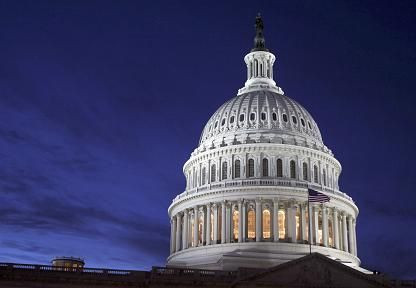White House, Senate GOP Reach Fiscal Cliff Deal - Senate Vote Is Next

UPDATE 9:05 p.m. ET: A fiscal cliff agreement has been reached between the President Barack Obama and Senate Republicans, an Obama administration source confirmed Monday night, Reuters reported. If the bill is passed by both chambers and signed by Obama, income tax rates would rise in the United States for the first time in more than 20 years -- achieving Obama's goal of increasing taxes on upper-income adults while preventing the worst impact of the fiscal cliff. A Senate vote early Tuesday morning is possible; if it passes, the House would review the bill Tuesday afternoon.
The source said Democratic Senate Majority Leader Harry Reid and House of Representatives Minority Leader Nancy Pelosi had signed off on the deal.
The agreement includes a balance of spending cuts and revenue increases, the source said.
**
UPDATE 8:35 p.m. ET: One of the nation's top labor leaders, Richard Trumka, president of the AFL-CIO, tweeted Monday night that Vice President Joe Biden may have sacrificed too much to strike a deal with Senate Republicans. “Its not a good #fiscalcliff deal if it gives more tax cuts to 2 percent and sets the stage for more hostage taking,” Trumba tweeted.
**
UPDATE 7:05 p.m. ET: Senate Minority Leader Mitch McConnell, R-Ken., announced that Senate negotiators including Vice President Joe Biden, D-Del., have agreed to postpone the automatic spending cuts -- formally known as sequestration -- for two months. If passed by the Senate and House, and signed by President Barack Obama, that would delay the $110 billion in cuts -- split equally among defense and non-defense programs - until early March.
**
The United States will technically go over the so-called fiscal cliff, despite the fact that U.S. Senate lawmakers Monday afternoon agreed to maintain current tax rates for all, except inviduals with adjusted gross incomes of $400,000 or more, and joint-filers with incomes abovc $450,000.
The House of Representatives went into recess early Monday evening - well before the midnight deadline - without a vote. House Republicans said they will hold votes on other bills, as the Senate as not acted on the fiscal cliff bill. As of late Monday afternoon, Senate leaders had not determined whether the Senate bill will simply block the tax hikes, or also include spending cuts. If Senate Democrats and Republicans resolve those differences, a Senate vote could occur Monday night.
Senate Minority Leader Mitch McConnell, R-Ky., comfirmed that negotiators gave the go signal on provisions for dealing with tax rates. However, both sides are still debating whether or not to delay spending cuts.
What's more, lawmakers may have bought themselves 'a one-day extension' because New Years Day is a federal holiday, but more than $500 billion in tax increases will begin to take effect and $109 billion slashed from defense and domestic programs on Jan. 2, if no measure suplanting curent fiscal cliff legislation is enacted into law.
Further, the House's decision not to attempt a tax/budget vote Monday night occured just hours after President Barack Obama announced that Congress was close to an agreement that would save middle-class taxpayers from a tax hike.
"It appears that an agreement to prevent this New Year's tax hike is within sight," he said. "But it's not done."
Reports suggest that Obama's jumping the gun might have contributed to stiffling the negotiation. Some GOP lawmakers issued compliants after the president's press conference, saying he was "heckling" Congress.
Obama gave his speech in front on a group of middle-class Americans.
"What did the president of the United States just do?" said Sen. John McCain, R-Ariz. "Well, he kind of made fun, he made a couple of jokes [and] sent a message of confrontation to the Republicans."
"I think the American people have to wonder, whether the president really wants this issue resolved, or is it to his short-term political benefit for us to go over the cliff?" he continued.
© Copyright IBTimes 2025. All rights reserved.






















